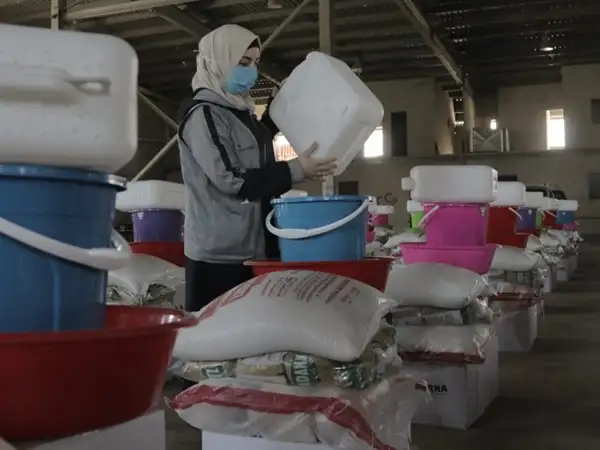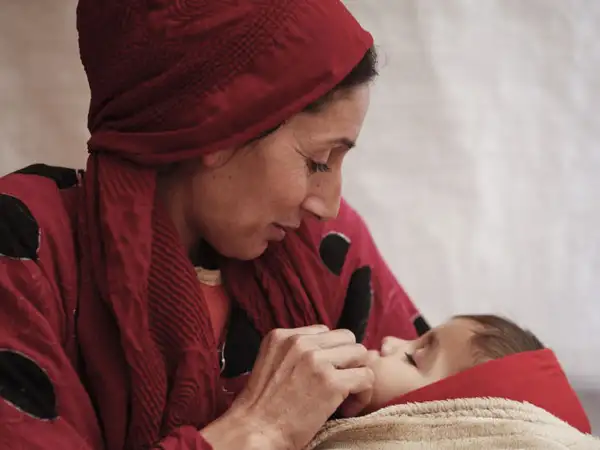CAFOD’s partners have been working in Syria throughout the conflict and will continue doing so as humanitarian needs remain at unprecedented levels.
Widespread contamination from explosive ordnance (EO) and war debris in Syria has resulted in a 400% increase in the rate of injuries or fatalities in the first two months of 2025, as communities move to or within heavily contaminated areas in an effort to rebuild following the fall of the Assad regime. A third of those wounded or killed in these incidents are children.
As officials gathered at the Brussels IX Conference on Syria and the Region at the EU on Monday, over 150 NGOs working across Syria, and neighbouring countries, urged the international community to commit to longer-term, sustainable recovery, which prioritises the rights, safety and dignity of all Syrians.
Hombeline Dulière, Programme Manager for CAFOD’s Syria Crisis Response, said:
“Civilians are continuing to pay the highest price in Syria. Renewed conflict in coastal areas demonstrates how fragile the situation is.
“The cautious optimism four months ago following the fall of the Assad regime could not have foreseen the unprecedented aid cuts that would follow. Record-high needs and an increase in violence across Syria are putting stress on already overstretched resources.
“Syria’s recovery requires a sustainable approach to aid, to enable Syrians to rebuild their communities, foster resilience and create self-reliance.
“International players must support a peaceful transition with meaningful inclusion of civil society, women, and diverse Syrian communities - and investment in infrastructure to help rebuild and restore essential service provision.”
Fourteen years of conflict in Syria has devastated the country, with 16 million people – almost 70% of the population - reliant on aid. Ninety per cent live below the poverty line and more than half struggle to find adequate food. Immediate, strategic, longer-term action is required to protect civilians and ensure communities do not remain trapped in “sticking plaster” emergency response cycles.
Millions of people in Syria are without education, healthcare or jobs. A critical lack of infrastructure has left hundreds of thousands without access to water or electricity for months. In addition, structural, economic, psycho-social, protection and legal barriers continue to pose significant barriers for those wishing to return home.
Syria has great potential for recovery, but it needs more than short-term aid, a meaningful path to stability.
Brussels IX must deliver concrete action. The cycle of crisis must end. Syrians deserve the chance to rebuild their lives, and the time for decisive, coordinated action is now.
Notes to editors
For more information or interview requests, please contact:
Rosalind Mayfield (CAFOD Media Officer)
CAFOD Press Office
CAFOD’s 24/7 media hotline
CAFOD is the official aid agency of the Catholic Church in England and Wales, and part of Caritas Internationalis, working with communities across Africa, Asia, the Middle East and Latin America to fight poverty and injustice, including those worst hit by climate change. The agency works with people in need, regardless of race, gender, religion or nationality.
The 150 NGOs are represented by Syria INGO Regional Forum (SIRF), NWS NGO Forum, NES Forum, Syrian National Alliance and Syrian Network League. For further details contact info@sirf.ngo.
Recommendations to Brussels IX participants included:
Sustained financial commitments: A strong conflict-sensitive approach towards supporting returns, reintegration and host ommunities., with an emphasis on self-reliance and resilience.
Housing, land and property rights: Without secure property ownership and restitution mechanisms, Syrians – particularly returnees - face risks of displacement, exploitation and deepened social tensions. Programs must address specific barriers that women and children face in securing legal documentation.
Protection and mine action: Protection monitoring must be prioritized and rapidly scaled up to reduce the number of injuries from UXBs and landmines.
Locally-led solutions: Syrian civil society must stay at the forefront of the humanitarian response and retain the right to engage and lead efforts moving forward.
Safe, voluntary and dignified returns and refugee protection: Host countries must uphold their obligations and ensure refugees are not deported or pressured to return under unsafe conditions.
You can provide vital emergency aid to vulnerable families both inside Syria and in neighbouring countries.
Please join us in praying for peace in Syria with these prayers of intercession.




